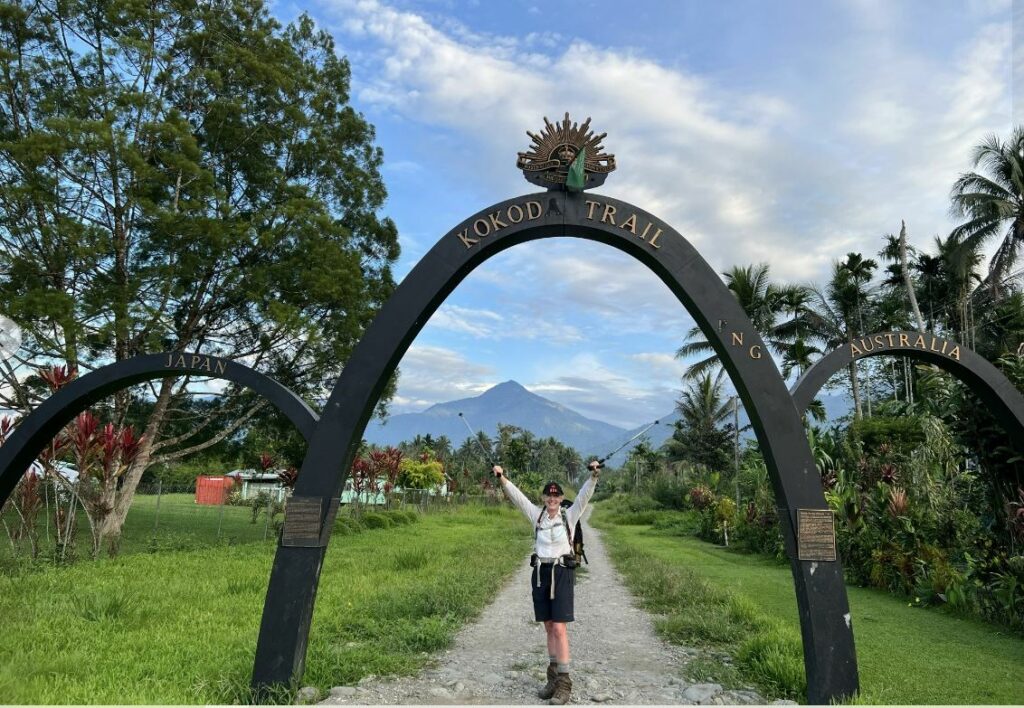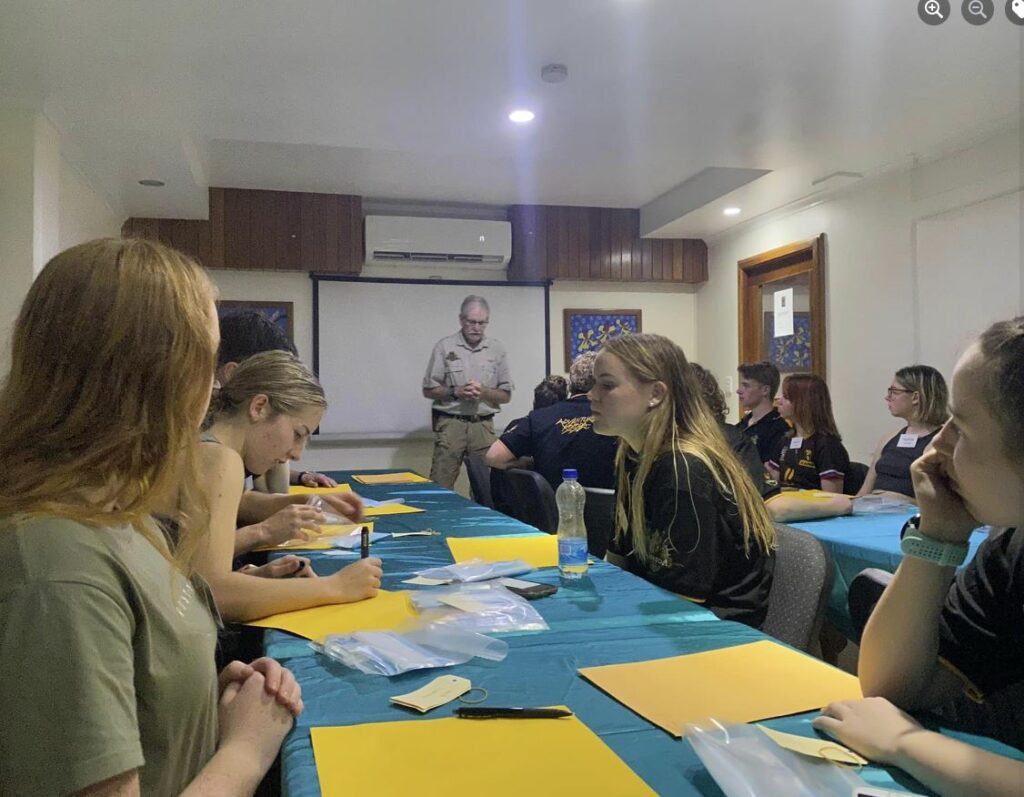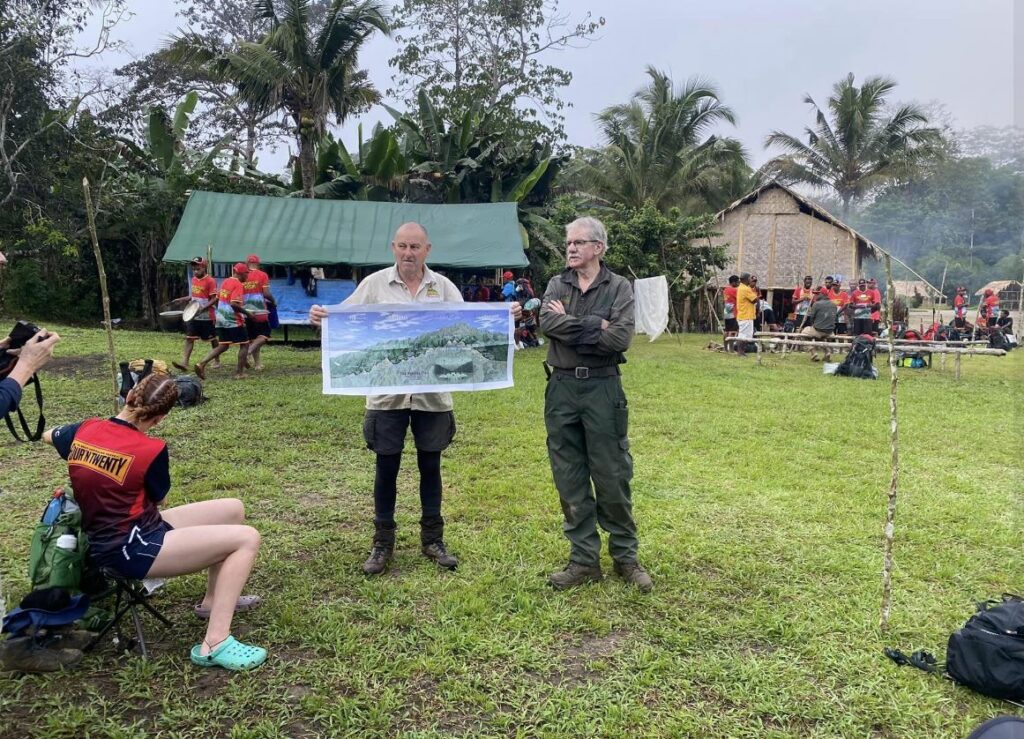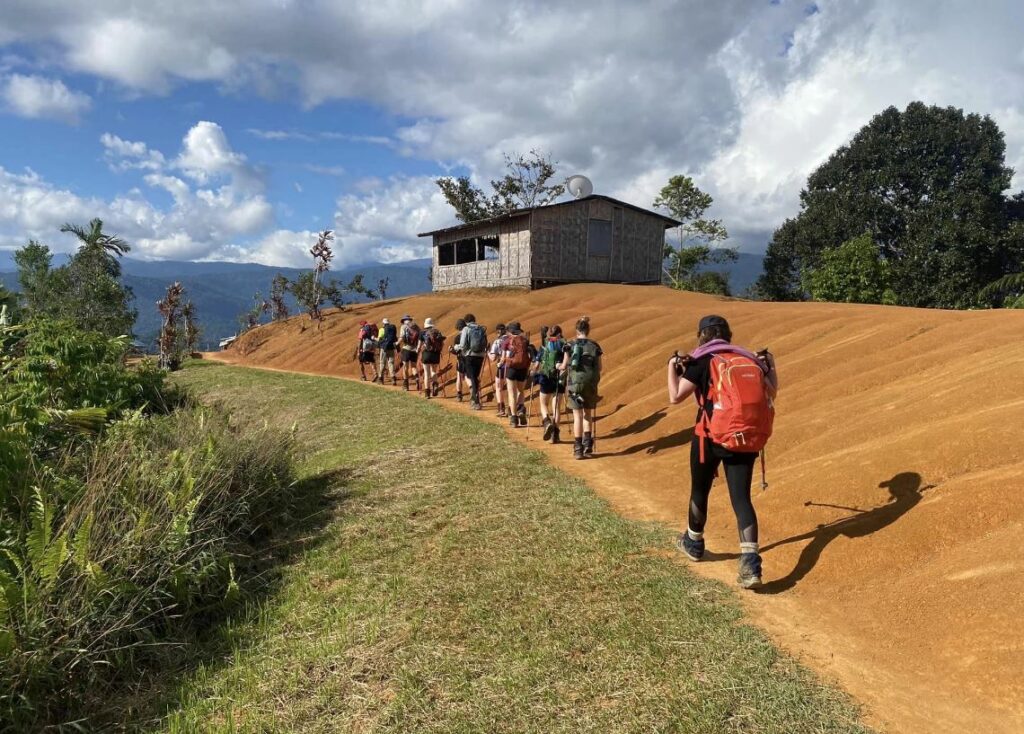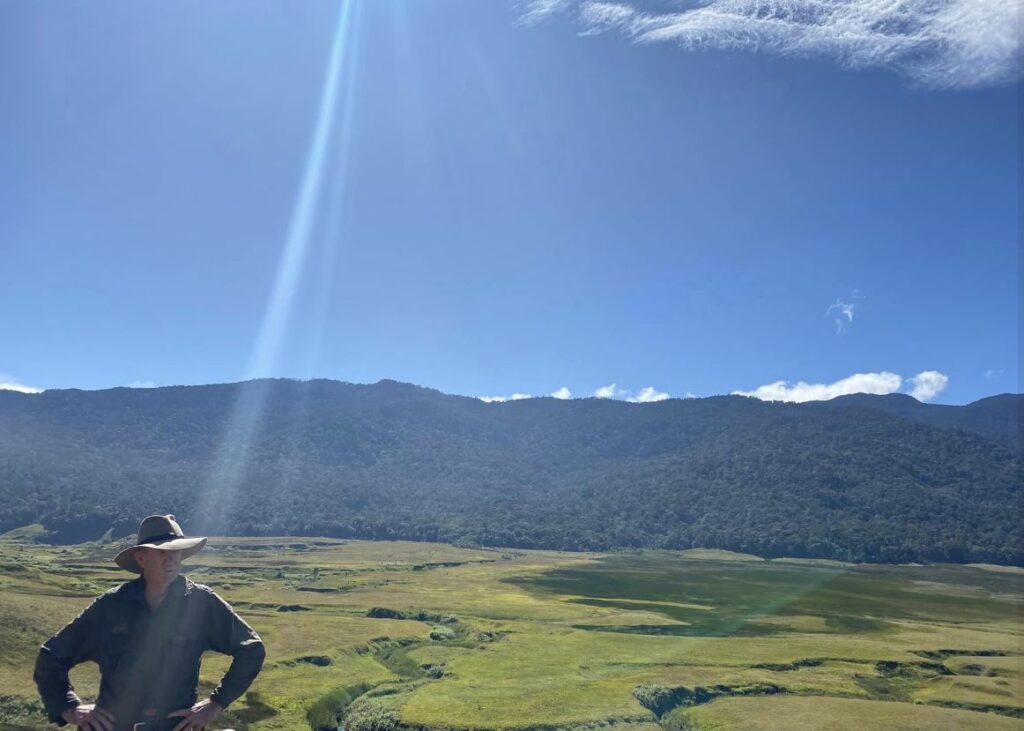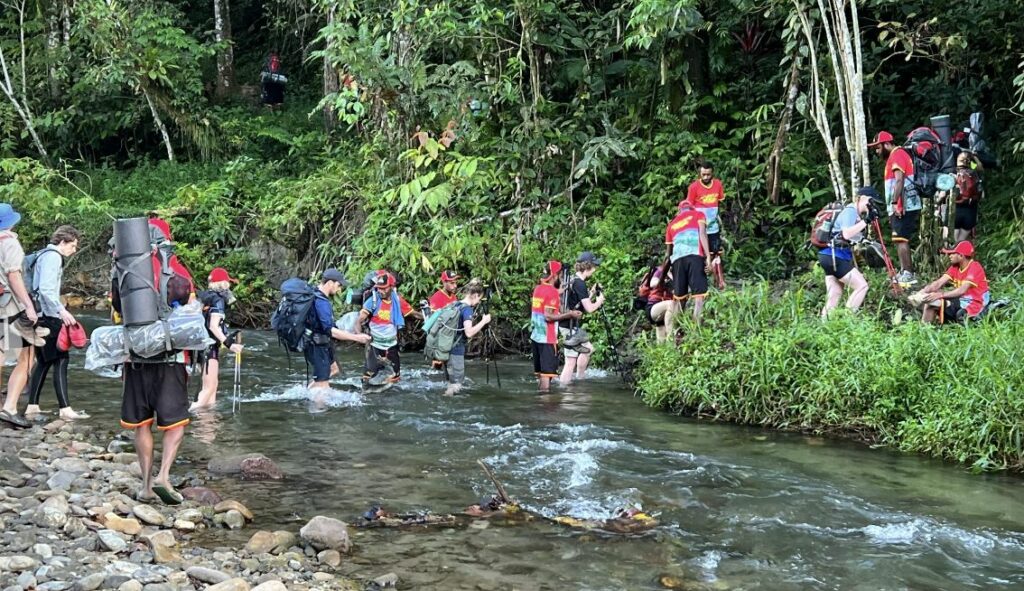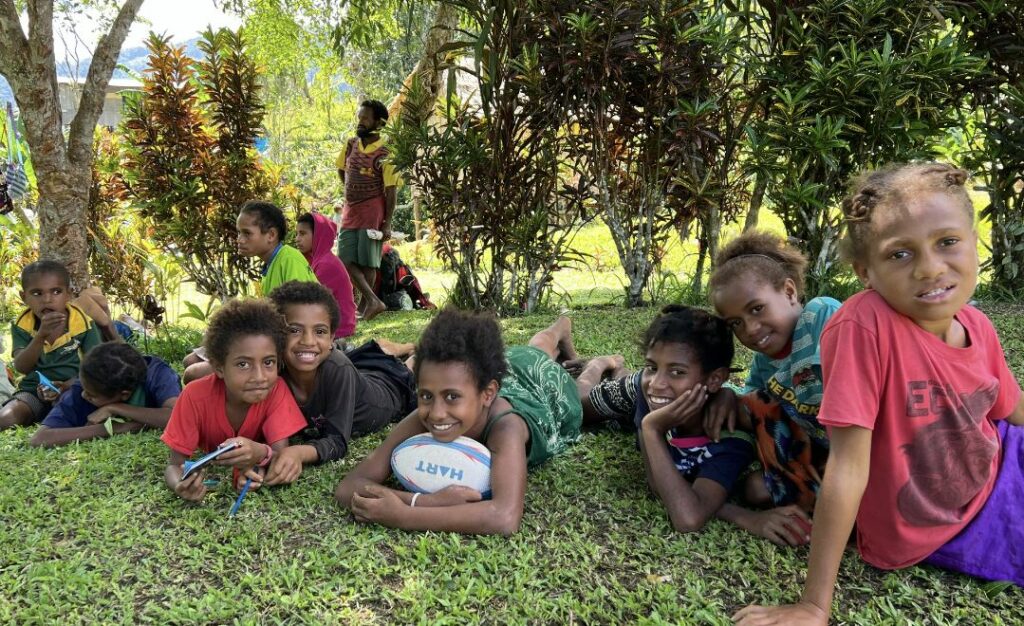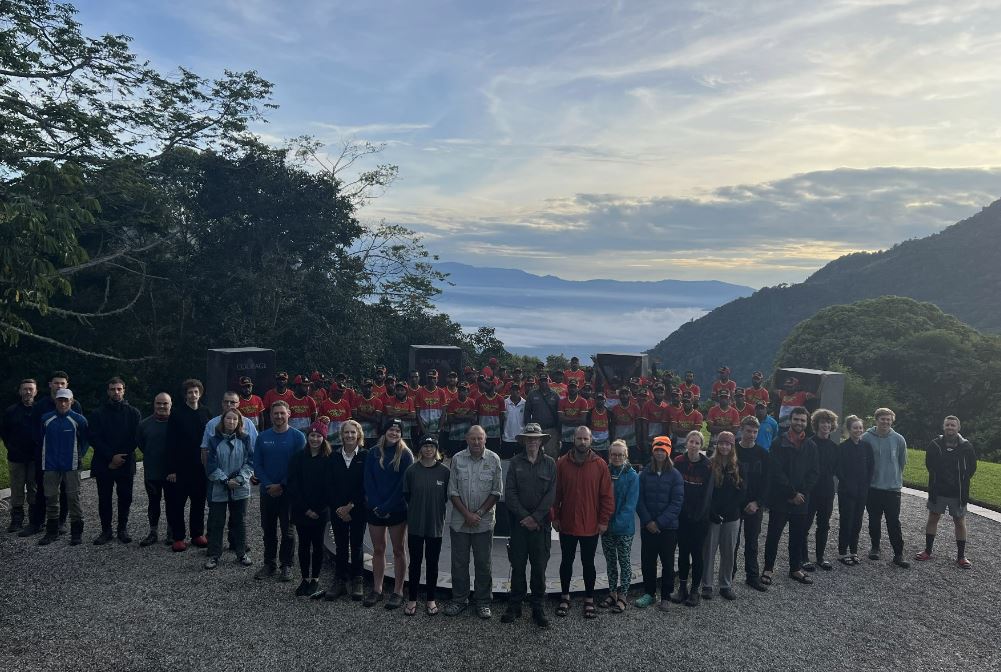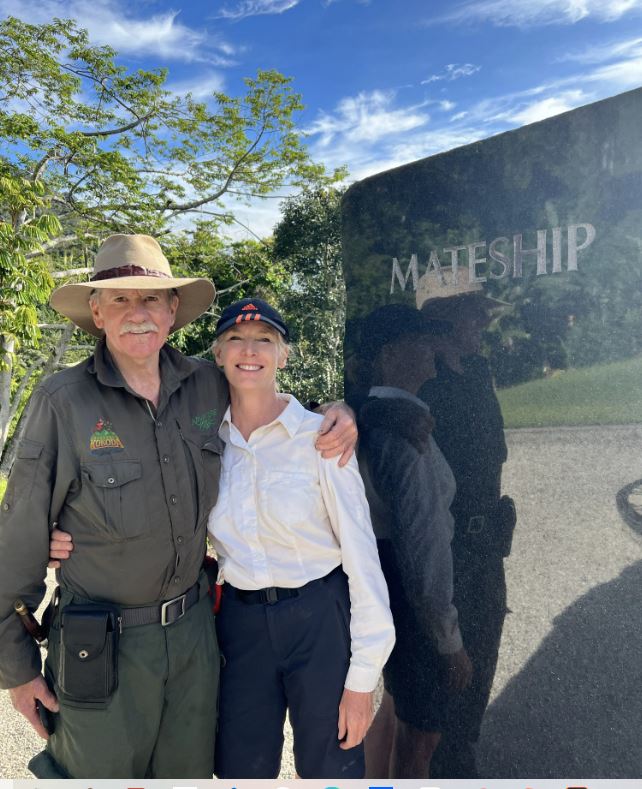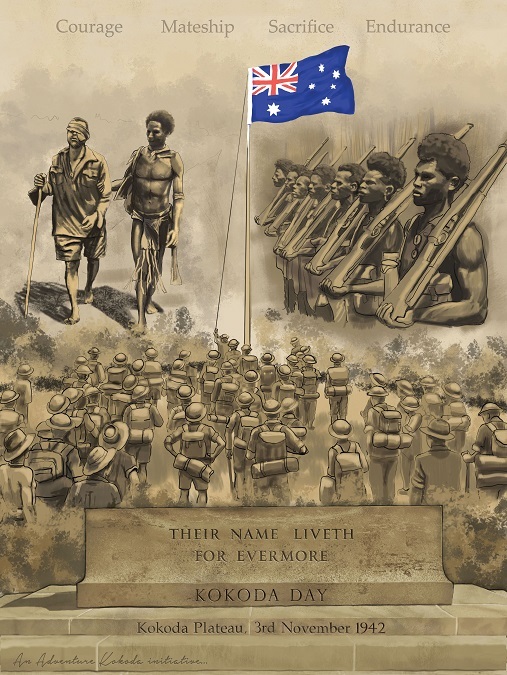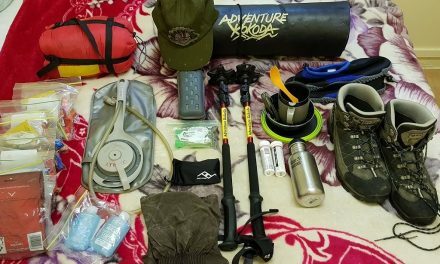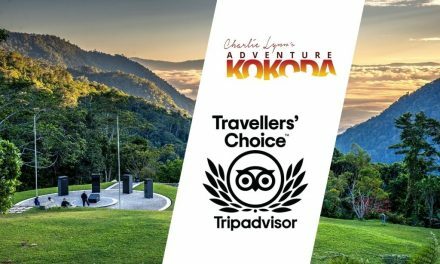Catherine Pearman is a teacher at The Kings School Preparatory School for Boys – she is also a wife, a mother, and a mentor.
In 2022 Catherine trekked Kokoda to interpret the pilgrimage for the benefit of the young Kingsmen she teaches at one of Australia’s most exclusive private schools.
Her interpretation is reflected in her 2022 Presentation Day speech on ‘Mateship, Resilience, Reflection and Gratitude’ she gave to her young chargers on her return.

‘Kingsmen, as you propel yourselves towards the challenges and adventures that await you in life, you can look to these values to provide the unwavering fortitude and strength of character required to navigate the inevitable obstacles that will accompany your heroic journeys.
‘They will be the difference between making the distance or not. They are what defines you a Kingsman.
‘Today, I’m going to tell you a story about what it means to be Australian and how our school values are central to your development, throughout your life.
‘Values are like fingerprints; you leave them over everything you do.
‘A School and a nation are held together by shared values, shared beliefs, and shared attitudes.
‘The legend of Kokoda demonstrated that when values move beyond being words on a page and become the compass to guide action, we can achieve anything as an individual, as a school or as a nation.
‘Eighty years ago, during World War Two, the Kokoda campaign saved Australia from invasion by the Japanese in a series of battles fought in the muddy, inhospitable jungles of Papua New Guinea.
‘With most of our forces tied up in the Middle East and Europe, a group of inexperienced part-time soldiers were tasked with intercepting the Japanese who were making their way south to Port Moresby – just a stone’s throw away from the north coast of Australia.
‘The Kokoda Trail fighting was some of the most desperate and vicious encountered by Australian troops in the second World War.
‘The average age of soldiers was teenagers or early twenties. They were ill-equipped and had not yet developed effective jungle warfare tactics, they were outgunned by a superior army and were fighting at the end of a very long and difficult supply line.
‘The conditions were horrendous – the extremely thick jungle was only matched by the steepness of the terrain and torrential rain and mud. The ever-present threat of disease such as malaria, dysentery and dengue fever, struck down four thousand of our diggers.
‘625 men shed their blood and more than a thousand were wounded.
‘Ultimately, those brave Australians were successful in holding that treacherous ground which marked a major turning point in World War Two.
‘You ask what does their story have to do with me?
‘At its core, the story of those young soldiers, as with the opening chapters of your life story is all about values – And I suggest to you, that putting values into action is what it means to be a Kingsman.
‘Over the decades trekking Kokoda has become a rite of passage for thousands of Australians. I walked this punishing trail in July.
‘Kokoda challenges you, mentally and physically; it tests your courage and endurance.
‘To succeed on your own journey, you must have a strong foundation. Here at King’s, that bedrock has been set.
‘Preparation, resilience, and hard work are required to complete difficult tasks, and, in my case, age presented no barrier to achieving my goal.
‘To finish the gruelling Kokoda Trail or anything in life; you must be ready. The best preparation for tomorrow is doing your best today.
‘Look at the terrain; to tackle this countryside, I worked six days a week for a year to build my strength, carrying weights upon my back as I walked. Strong body – strong mind.
‘Yes, there were times that I didn’t want to do the training, I wanted to sleep in, but complacency is a barrier to success. It is the courage to continue that counts. Our soldiers did it under gunfire, hunger, and disease.
‘Boys, you can dream for success, and as you get older you will visualize what you want to be but remember you must work for it.
‘Kokoda taught me about MATESHIP.

‘This is Owers’ Corner – the start of a 138km 9-day trek carrying a 10kg pack. To undertake the Kokoda Trail, I needed help just like the diggers in World War Two.
‘I met Judah, my porter and I asked – Are you going to get me across those ranges?
‘Without hesitation, he said “Yes.” I immediately trusted him and felt safe.
‘We began our steep descent into the jungle and from the first slippery steps, Judah was behind me, catching me, driving me forward and gently guiding my footsteps.
‘He instinctively knew where I needed him most, whether that be in front, beside or behind me. No matter the obstacle, he was there.
‘Judah was LOYAL.
‘His unwavering attention to me showed the true depth of his character. Despite not having the boots and poles and top-class gear that I had, there was never a moment when I wasn’t his first priority. Whether it was ensuring I kept my balance on a rickety bridge or making sure I took the next muddy step safely, his loyalty to me was unquestionable.
‘Judah was TRUSTWORTHY.
‘Covid had hit PNG hard. With no trekking for two and a half years, the trail had not been maintained. There was a collapsed section of trail that would have been impassable for me alone. The ground just fell away. Judah jumped ahead of me and lifted my whole-body weight over the gap. I trusted in Judah’s strength, vigilance, and devotion as he led me to safety.
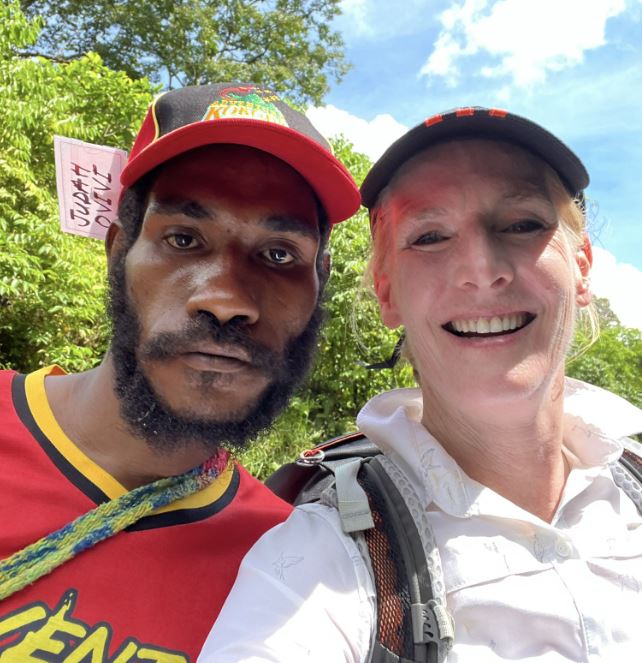
‘He and the rest of our guides embraced the spirit of their forefathers known as the Fuzzy Wuzzy Angels. During the Kokoda campaign the local Papuans brought supplies to our soldiers and cared for the wounded.
‘As stretcher-bearers, they carried the Diggers through backbreaking terrain in unbearable conditions. They were responsible for saving the lives of countless soldiers.
‘The esteem and gratitude felt by our soldiers is captured very well by Sapper Bert Beros of the 7th Division, Royal Australian Engineers, in his poem entitled “The Fuzzy Wuzzy Angels”.
“Bringing back the wounded just as steady as a hearse
Using leaves to keep the rain off, and as gentle as a nurse,
Slow and steady on that awful mountain track,
And the look upon their faces makes us thing that Christ is black,
Not a move to hurt the wounded, they treat him like a saint”.
‘Boys, I liken Judah to your parents and teachers. They devote their lives to your success – they will be there to keep you moving forward; to point out obstacles you may not have seen; to lend a hand and provide a word of encouragement when you need it most. Trust them to know when to lift you, when to guide you, and when to let you get on with it yourself.
‘Through the actions of Judah and the Fuzzy Wuzzy Angels, I came to truly understand that trust, compassion, and loyalty are not words spoken from the lips – but actions from the heart. This is true mateship.
‘By lunchtime on the second day, Charlie our trek leader, had us introduce ourselves to our fellow trekkers and explain our reasons for tackling Kokoda.
‘Some were there because their relatives fought on this sacred ground. Others to confront their personal challenges. For me, it was a pilgrimage to honour our World War 2 heroes and to set an example to my children that anything is possible.
‘From that moment, the 25 of us became a team and in the ensuing days, we helped each other in the toughest of times – resulting in an everlasting bond built upon trust.
‘Shane, one of my trek mates, displayed quiet attentive observation. He stepped up and encouraged us when he recognised people needed support. On the 3rd day, he said, “You’re getting stronger” and on another day he told me, “You smashed that today”. Those words of encouragement gave me an incredible boost. How powerful we can be in this world with but the smallest of words.
‘You, as a Kingsman already know that mateship matters. Together, we can do so much. It feels good to encourage your mate in the classroom or in the playground.
‘Boys, you need to have the courage to let your mates know when you need a hand. As a team-mate you need to have the awareness and empathy to provide that support.
‘To achieve your goals, you need to know your mates, know your team and share your feelings – it is strength.
‘Kokoda taught me about resilience.
“Reveille Cooeeee and morning troops”
‘That was the sound of our 5am alarm each day.
‘Charlie would then brief us on the challenges that lay ahead for the day’s trek. At times I was daunted about what was to come but at the same time I was also excited.
‘If I looked at the entire 138 km, the trek looked formidable – almost unachievable. Charlie broke the impossible down into a single day’s challenge. Whilst I was still apprehensive, I felt success was now within reach.
‘We trekked an average of 9 hours a day – up to 21km.
‘The terrain was discouraging because it looked impossible. In parts the trail was only 45cm wide. There was an unrelenting mixture of steep steps of snaking tree roots and rocks on a slippery, muddy, weaving track. Steep climbs and descents were unending. Entangled thick vines, sharp kunai grass and trees blocked the path. The heightened attention to each step meant that exhaustion was not just physical but mental as well.
‘Day One was a baptism of fire; it threw everything at us, slippery conditions, high humidity sapping the energy from even the fittest trekker, drenching rain, water crossings, punishing climbs and dangerous descents and to add to the peril; night walking.
‘We arrived at camp in the darkness and dead of night.
‘I was drained mentally and doubt crept in. I asked myself “What am I doing here? What did I get myself into?”
‘There were many times on the trail that I had to tell myself I could do it. I relied on my own self-talk and positivity. In those moments, I thought about you, my students. When you boys are struggling, I reassure you to keep working and trust the process. I needed to practice what I preached; I took stock and challenged my self-doubt.
‘I quickly learned to find my own walking pace. The terrain was so tough that the moment I tried to catch up with someone who was faster or stronger, I would slip.
‘Boys, when you are working towards a goal make sure to do it on your own terms. Trust in your own abilities and make progress at your own pace.
‘River crossings were exciting and sometimes difficult.
‘At times, we had the luxury of crossing on a dilapidated bridge. Other times, bridges had been washed away leaving us to traverse a river with water up to our waists. Between the slippery moss-covered rocks beneath and the strong current pushing me, I knew I had to concentrate on each step. But worst of all was the wet shoes & socks for days on end. How our soldiers fought with wet muddy feet for months is nothing short of inspirational.
‘The terrain required me to look down constantly, so I didn’t fall.
‘However, to take in the beauty of the landscape but also to keep the goal in mind and to see what lay ahead I had to stop and look up.
‘Boys, when you are faced with an overwhelming challenge, break it down into smaller parts. Look down, focus on the small part of the task, and go for it. Then look up at your goal to see the big picture. Recognise how far you’ve come – over the hill, through the river or in the classroom – and feel proud of yourself. You may see that the challenge you once thought was overwhelming is now a stepping-stone.
‘Kokoda taught me that reflection is powerful.

‘Kokoda is steeped in history. It bears the weight of a nation’s strength in its weakest moment. To persevere through the gauntlet of Kokoda, while at the same time appreciating its history, led me to a deeply profound experience. One that was only possible through reflection.
‘I enjoyed my quiet time on the trail completely absorbed in where I was. I would look deep into the jungle trying to imagine what had occurred here and many times found myself saying prayers for a soldier who could have been wounded or died right where I was standing.
‘My reading prior to coming to Kokoda allowed me to better appreciate the significance of my experience at each moment along the trail. Rather than just treating the trek as a walk – it was a sacred pilgrimage.
‘You all have brothers and sisters. Or you know someone who does. Would you be able to hold your brother in your arms as he died?
Stan Bisset did for his brother Butch. I stood and shed a tear where this happened. I touched the rock where Bruce Kingsbury died. His heroic actions at that spot earned him a Victoria Cross. At Bomana Cemetery I visited both their graves, amidst 4,000 others. To pay my respects to these fallen heroes was an honour and a privilege.
‘A very strong memory for me was the Dawn Service held at Isurava. It was moving because I understood its significance. I had experienced the terrain and conditions and I knew the personal stories of the diggers. The four granite pillars of three and a half tonnes; the weight of those words that endure to this day – courage, endurance, mateship, sacrifice – reminded me that great deeds came from the great depths of love.
‘Boys, reflection can be overlooked in our busy lives. Experiences will be deepened if you are present in the moment and take time to reflect on what they mean to you.
‘Kokoda taught me to be grateful.
‘Arriving at villages we were welcomed with smiles and waves. The children were initially shy but livened up once we threw a footy around. Their subsistence lifestyle was in sharp contrast to my own life.

- Where my family shares 2 toilets for 2 people – this community shared one toilet among 150 villagers.
- I have hot showers every day. People in these villages bathe in the cold water of the river
- Children are expected to do physical chores like cutting grass with a machete blade, scrubbing pots, and harvesting vegetables for meals.
- Villagers sold us cans of Coke and twisties that they had carried on their backs for 100km. The price tag said 2K but they asked for 10K which I happily paid. The true value was not in the drink. It was in the hard work and effort to get it to me.
- Schools had basic classrooms, with 50 students crammed in and only hard wooden tables. Despite the lack of resources, the children were enthusiastic learners. They know that education is a privilege.
‘Seeing how the Papua New Guineans lived their life made me appreciate what I have. It helped me understand not to take anything for granted. They have so little by our standards, yet they don’t complain.
‘In 1942, our soldiers also had very little. Our young, inexperienced part-time soldiers, in impenetrable jungle conditions, ridden with disease, with broken supply chains and nothing but their mates and a Bren gun came face to face with the powerful Japanese Imperial army. They would fight tooth and nail for four vicious months. Not through armament or technology would the difference be made, but in character and resolve.
‘Boys, happiness doesn’t come from what you have. Success doesn’t just come from having the right abilities or resources. It comes from what you make of what you have. Look at your home, your family, and your school. Be grateful for what you have in life and utilise everything to the full extent.
‘If these children can be so happy with so little, and soldiers can win a battle with so little, then Kingsman – armed with values and character – can change the world!
‘This year, I walked in the footsteps of heroes.
‘The men who rest in the jungles of Papua New Guinea, they will never grow old. Their legend will never tire. Their values of courage, endurance, mateship and sacrifice – will never die.
‘This is our magnificent inheritance.
‘My experience of mateship, resilience, reflection, and gratitude reaffirmed the power and importance of our school’s values in navigating life’s challenges. They will equip you well when you need them most. Our school, and our spirit is alive and well. It is where your destiny is being forged and God’s grace is still shining.
‘God bless you.
‘Thank you.
